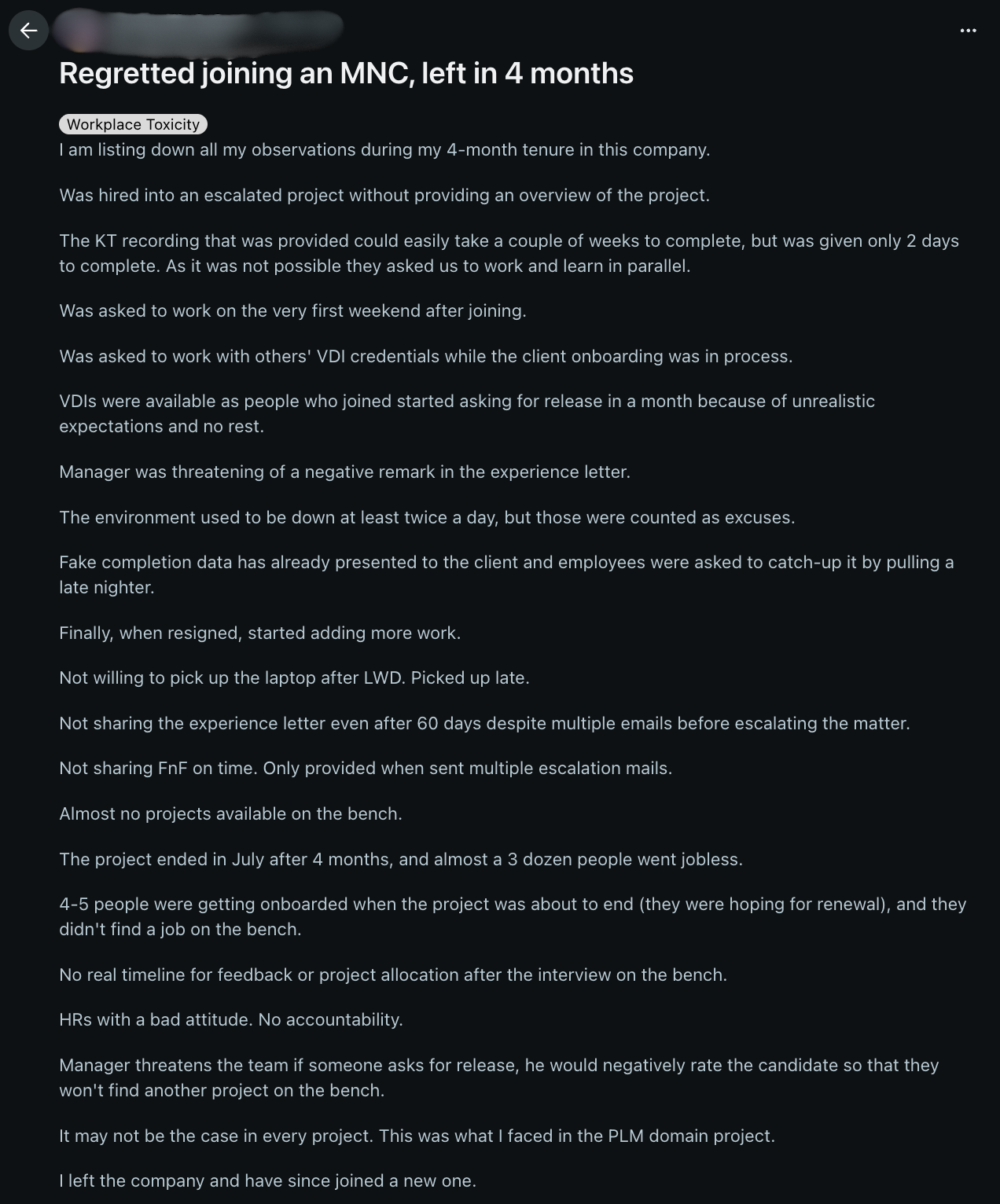ARTICLE AD BOX

Indian employee quits job within four months (representative image)
Imagine joining a company with excitement, only to realise after a few weeks that your new job is not what you expected. A Reddit user recently shared a four-month experience that reads like a cautionary tale for anyone starting a new role.
They were thrown into an escalated project with no proper overview or guidance. The knowledge transfer was recorded, but they were expected to complete it in just two days, even though it could easily have taken weeks. On the very first weekend, they were asked to work and even use other employees’ credentials while the client onboarding was still in progress.Things didn’t get easier. Employees were asked to make up fake completion data for the client, often requiring late-night work.
Managers threatened negative remarks in experience letters for anyone asking for release. When the Redditor resigned, more work was added, laptops were collected late, experience letters were delayed for over sixty days, and final settlements were only processed after multiple escalations.
The project ended in just four months, leaving dozens of employees without jobs, while new hires near the end of the project found themselves with no work.
This story is a real-world example of how poor planning, unrealistic expectations, and lack of accountability can create a stressful, toxic workplace. Learning to spot early warning signs can save you from months of frustration and career setbacks.

Red flags during recruitment
Toxic workplaces often show their true colours before your first day. In this case, the job description was vague, interviews dodged questions about timelines, and reporting structures were unclear.
If you notice hesitation or vague answers during interviews, it usually means the company has deeper issues. Asking clear questions about project scope, deadlines, and team support can help you figure out if this is a place you can thrive—or just survive.
Onboarding and workload management
A good company sets employees up for success from day one. Red flags include being thrown into a complex project immediately, squeezed knowledge transfer, or being asked to use someone else’s credentials.
A healthy workplace provides clear instructions, proper documentation, and enough time to get up to speed. Being expected to learn and deliver at the same time, or working weekends right after joining, is a sign that the company values output over people.
Management practices and employee treatment
Managers define the day-to-day experience at work. Threats of negative remarks in experience letters, piling on excessive work, or using system downtime as leverage are all warning signs.
Watch how managers respond to questions, treat colleagues, and handle accountability. A workplace that relies on fear is rarely sustainable, and it often leaves employees stressed and undervalued.
HR, feedback, and career growth
HR is supposed to be the bridge between employees and the company, but poor HR practices reveal a lot about workplace culture. Delays in experience letters, slow final settlements, and unclear project allocation are red flags.
Lack of feedback or growth opportunities indicates the company may not prioritize employee development. Research reviews online, talk to former employees, and ask direct questions about HR processes before committing to a job.
Protecting yourself and making smart career choices
Avoiding toxic workplaces requires attention and action. Research the company, check team culture on LinkedIn or other platforms, and clarify project timelines and workloads before joining.
Keep a record of communications during onboarding. Trust your instincts. If something feels off early, don’t ignore it. Leaving a toxic job may feel uncomfortable, but it protects your mental health and keeps your career on track.
The bottom line
Toxic workplaces thrive on fear, unrealistic expectations, and lack of accountability. Observing recruitment practices, onboarding, management behaviour, and HR processes can reveal early warning signs. By learning from the experiences of others and asking the right questions before joining, professionals can make informed career decisions, avoid unnecessary stress, and continue growing in a healthy work environment.

 11 hours ago
5
11 hours ago
5









 English (US) ·
English (US) ·